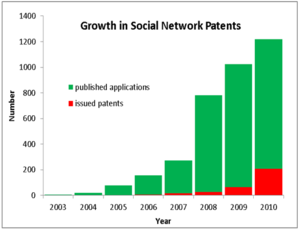Issues relating to social networking services
The advent of social networking services has led to many issues spanning from misinformation and disinformation to privacy concerns related to public and private personal data.
[1] For instance, text mining techniques are leveraged[2] to detect regular activity of spamming which reduces the viewership and brings down the reputation (or credibility) of a public pages[3] maintained over Facebook.
John Herrman (2018) compares the function of algorithms in adjusting content to omniscience and recounts the unpleasant experiences that coincide as a result.
On April 10, 2018, Mark Zuckerberg testified before Congress on questions defining Facebook's policy, information handling and data design systems.
Congress placed emphasis on addressing Facebook's tracking of user data online, skeptical that the social networking site can regulate itself.
It also enforces the general positive atmosphere of the website without drawing attention to unpleasant happenings such as friends falling out, rejection and failed relationships.
[23] Many people use social networking sites to express their personal opinions about current events and news issues to their friends.
In September 2013, a woman got fired over Facebook because she posted disruptive information about her company stating that military patrons should not receive special treatment or discounts.
In April 2011, a Lloyd's banking group employee in the United Kingdom was fired for making a sarcastic post about the higher salary of her boss in relation to hers.
[27] In February 2013 there was another case where a flight attendant working for a Russian airline lost her job because she posted a photo of herself giving the middle finger to a plane full of passengers.
In March 2012, Facebook decided they might take legal action against employers for gaining access to employee's profiles through their passwords.
[30] According to Facebook Chief Privacy Officer for policy, Erin Egan, the company has worked hard to give its users the tools to control who sees their information.
Employees may still give their password information out to get a job, but according to Erin Egan, Facebook will continue to do their part to protect the privacy and security of their users.
[31] The relative freedom afforded by social networking services has caused concern regarding the potential of its misuse by individual patrons.
In October 2006, a fake MySpace profile created in the name of Josh Evans by Lori Janine Drew led to the suicide of Megan Meier.
One study[38] highlighted that the most common incidents included inappropriate comments posted on social networking sites (43%), messages sent to contacts that were never authored (25%) and change of personal details (24%).
[42] Citizens and governments have been concerned with the misuse of social networking services by children and teenagers, in particular in relation to online sexual predators.
[specify] A 2008 panel concluded that technological fixes such as age verification and scans are relatively ineffective means of apprehending online predators.
He left Twitter due to "too much aggression and unkindness around" emphasizing how trolls can negatively impact people's lives (Cohen, 2014).
[53] This highlights how offensive tweets and messages sent on any social networking platform does have repercussions for individuals and they have to be aware that they have to face the consequences of their actions.
However, this has the side effect of allowing those with fringe political and/or economic views, such as white nationalists, terrorists, racists and neo-Nazis, to easily spread propaganda and convert others to their ideology.
Sherry Turkle, the founder and director of the MIT Initiative on Technology and Self, stated, "Networked, we are together, but so lessened are our expectations of each other that we feel utterly alone.
John T. Cacioppo, a neuroscientist at the University of Chicago, claims that social networking can foster feelings of sensitivity to disconnection, which can lead to loneliness.
[63] It has also been argued among academics that correct moderation by an authority figure such as a boss or parent can improve the perceived well-being of an individual who navigates social media.
[74] What types of speech workers are protected from being fired for on social networking websites has been an issue for American companies with over 100 complaints as of 2011 on this topic having been made to the National Labor Relations Board (NLRB).
[82] New media websites have made our private lives much more public, especially when it comes to breaking up, since updates are able to be immediately viewed by everyone in our networks (which tend to be more people than we would normally tell personally); for example, having friends comment on your newly changed "single" relationship status, and having to explain what happened can be distressing.
These interpersonal interactions are mediated by what Goffman terms as "face-work", which are the actions undertaken to maintain consistency with one's face and to uphold the expressive order of social situations.
New media is being utilized as a tool for helping users present a desirable image of themselves, enabling them to save face in difficult situations.
Many digital social networking sites leave behind a trail of a user's interactions,[84] so deleting content may be an arduous process, more difficult than simply burning or throwing away an entire box of letters, photos, and mementos.
If we consider this aspect with regards to the relationships maintained through social media platforms, we can easily point out a change in our understanding of friendship.
